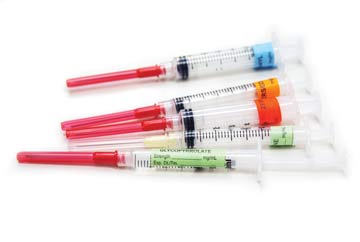You'll almost always pay more for premixed, prelabeled syringes prepared at a compounding pharmacy. You're paying not only for the drug, but also for the preparation time and the convenience of a syringe that is capped off and labeled and ready to administer: simply open up the package and administer the drugs immediately rather than drawing up medications and labeling syringes manually or with a syringe label printer. But don't let price dissuade you. It could be a cost-neutral proposition when you consider that:
- You'll waste less medication. You'll waste fewer drugs when you use prefilled syringes, studies show, especially in emergency medications such as atropine and phenylephrine, as well as succinylcholine. If your anesthesiologists draw up medicines for emergent situations and don't administer them within the hour, they must discard them. At least they should.
Let's say your anesthesia providers prepare 20 syringes with lidocaine, epinephrine and sodium bicarbonate for local cases, but only use 10 within 12 hours. "Any drug that's drawn up in a syringe and not immediately administered must be labeled with the name of the drug, the concentration or amount, and the expiration date if it's not going to be administered in the next 24 hours," says Phenelle Segal, RN, CIC, FAPIC, the president of Infection Control Consulting Services. Prefilled syringes of lidocaine, on the other hand, remain safe to use for up to 4 weeks, according to a study in Dermatologic Surgery.
Further, premixed syringes come in common dosage amounts so you'll waste less. Keep in mind, however, that some prefilled drugs have shorter beyond-use dating — most often a 30- to 90-day expiration date, whereas a vial from the manufacturer can last much longer. Lastly, a prefilled syringe's color-coded, tamper-evident cap lets you safely use it on another patient if for whatever reason you didn't use it during the case you'd planned.
- You'll save on medication supplies. It might not seem like much, but imagine not having to stock as many alcohol swabs, syringes and needles.
- You'll cut down on medication errors. Researchers have found that anesthesia providers don't always include all the key information they should on syringe labels. They might, for example, list the drug name, but not the drug concentration or expiration date. Prefilled syringes come labeled with name, date of expiration, concentration of drug and amount of drug. Still, experts say you should carefully read the label on any syringe before you inject it.
- You'll (all but) eliminate unsafe injection practices. You won't have to worry about staff using multi-dose vials on more than one patient, accessing medication in non-patient treatment areas, or not using a new needle and new syringe to enter medication vials.
"You minimize the risk of contamination from transferring the drug to a syringe, reduce the risk of operator error in volume calculation and reduce the risk of needle sticks to personnel," says Serafin Gonzalez, PharmD, CPh, director of pharmacy services at Bascom Palmer Eye Institute in Miami, Fla.
One note of caution: Prefilled syringes are not exempt from the one-and-done rule. Even though they come in common dosage amounts, prefilled syringes could have enough medication for more than one patient. Resist the temptation.
"Use pre-filled syringes for only one patient and discard them at the end of the procedure," says Ms. Segal, who also adds that you shouldn't carry prefilled syringes from room to room in containers or scrub pockets.
- You'll save time. Time could be your greatest gain. Your anesthesia providers will have more time to monitor the patient and the equipment rather than handle medication vials and needles. One study found prefilled syringe use let clinicians spend more time with patients and led to quicker OR turnover.
"Physicians', pharmacists' and nurses' time is not cheap," says Dr. Gonzalez.
.svg?sfvrsn=be606e78_3)

.svg?sfvrsn=56b2f850_5)